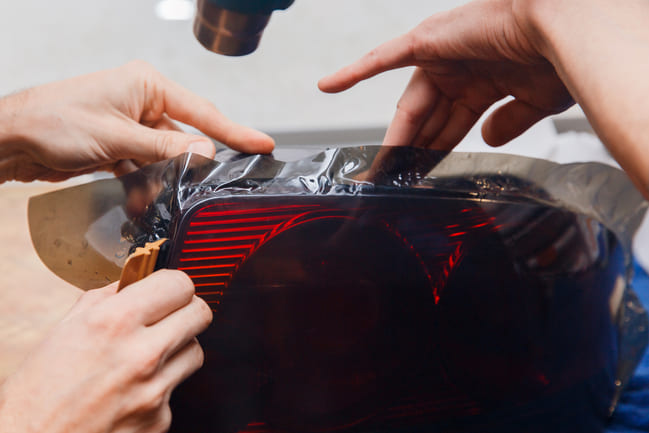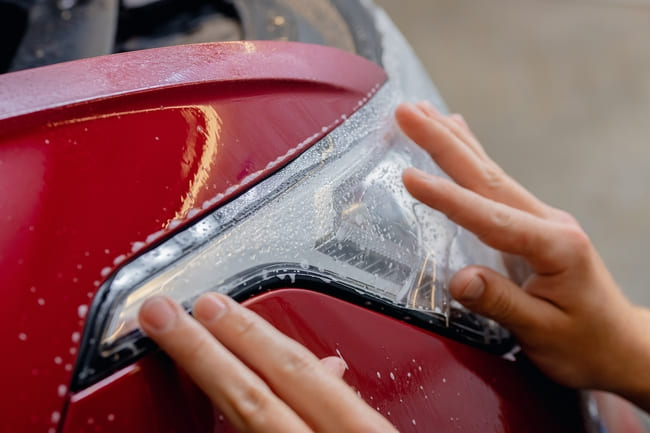
Every proud vehicle owner loves to show off their car in the best possible way. Thorough care of the exterior and interior is rarely neglected for fascinated drivers. They love to stage a vehicle in the perfect optical way. There are those who like to drive to the car wash to have their car cleaned there and those who prefer to use rags and buckets themselves and polish their vehicle to a shine. But thorough cleaning is not the only way to improve your car. But there are also numerous upgrades to try. Depending on experience and craftsmanship, new rims can be ordered and fitted, a new spoiler attached, the radiator grille painted or the windows tinted. But there are also many other ways to make your car stand out. For example, nowadays many people choose to have the headlights of the car wrapped in foil. This not only looks particularly strikingly sporty, but also protects the glass. We have summarized for you below what exactly is permitted and what is not and what costs you have to reckon with when wrapping the headlights.
Contents
- 1 Is a wrapping of the headlights in The United Kingdom actually allowed?
- 2 Nevertheless, I would like to wrap the headlights in foil – what do I have to pay attention to?
- 3 Are there any slides that are of any use to me?
- 4 What other advantages does a foiling bring?
- 5 The conclusion and a tip from CarTipsandmore
Is a wrapping of the headlights in The United Kingdom actually allowed?
First of all, the question arises as to whether foiling in The United Kingdom is permitted by law at all. In principle, only that which will later be approved by the TÜV should be changed or tuned on a vehicle. It is important here, for example, that the headlights of your car retain the original lights and colors. If you don't comply, in the worst case you will have to reckon with your operating permit being revoked. In order to avoid this, you should find out exactly what you can actually change on the headlights of your car and what you should keep your hands off. It is also important that you do not affect or dim the intensity and power of the light. This must be avoided at all costs, as you must continue to be clearly visible to other participants in traffic. So if you want your vehicle – what to assume – If you still want to use it on public roads, you'd better keep your hands off this tuning intention. Alternatively, you can color or redesign the area bordering the components themselves. It is important here that any change in the light can be excluded. Because changed colors or an impaired intensity of the light only confuses other road users and is therefore not permitted.
Nevertheless, I would like to wrap the headlights in foil – what do I have to pay attention to?

If you still don't want to be dissuaded from the idea of putting your hand on your car's headlights, then of course you can still do so. But let me give you a few tips along the way: only buy approved film that has also been checked. Also note that some headlights on certain car models get very warm, so the film will not remain free from damage. Once you have found foils that are approved, you should make sure that you avoid creating bubbles as you work. If you have not had much experience with tuning work before, you should contact specialists who will support you in your endeavor. Because in the worst case, if you make a mistake, you will lose your car's operating permit.
Are there any slides that are of any use to me?
Such slides do exist. A good example would be the stone chip protection film for headlights, which promises intensive protection against stone chips or the impact of other small foreign particles. In old vehicles, the headlight housing is usually made of glass, which of course makes it particularly susceptible to breakage. The modern vehicles on the market today mostly have headlight housings made of plastic. However, scratches caused by stone impacts on these plastic housings can scatter the light and, in the worst case, even dazzle other vehicles. To avoid this, a stone chip protection film is particularly appropriate and promises you effective use on public roads.
What other advantages does a foiling bring?

Not only stone chip protection films speak for themselves. There are also various other reasons why approved and controlled films have a positive effect. On the one hand, they are mostly car wash safe and thus protect the glass or plastic housing from the bristles of a car wash. They are also quite durable and can promise a firm hold for up to 4 years. Assembly is also very easy, so there is no need to disassemble the components. In addition, the said products are relatively inexpensive and available in all colors. But always remember: you don't like to see bright colors in the general inspection! But is there a kind of test seal that you can use when buying films to see exactly whether these films are TÜV-approved? Yes, there is. If you are looking for the right products, you should pay attention to the ECE test mark. Because this indicates that there is a building permit here. And always make sure: the light beam itself must be 100% transmitted and must not be clouded or dimmed.
The conclusion and a tip from CarTipsandmore
Finally, it can be said that wrapping your car in foil makes a difference visually and usually makes the car look more aggressive and sporty. But if you want to continue to use your car on public roads, you should make sure that the films that you want to buy and attach are actually approved and that the TÜV will not put a spanner in the works. You can be on the safe side here if you contact specialists and pay attention to certain seals of approval. You can also check if the headlights are dimming or if the light beam is affected in any way. If so, keep your hands off these slides. Because if you are unlucky, your operating license will be withdrawn with this tuning work. CarTipsandmore also recommends that you do not polish a dull headlight either. This can also be illegal under certain circumstances and cause you problems during the main inspection. Any work on the headlights of your car should therefore be clarified beforehand with a specialist in a workshop or contact the TÜV directly to be able to rule out unpleasant surprises later.
